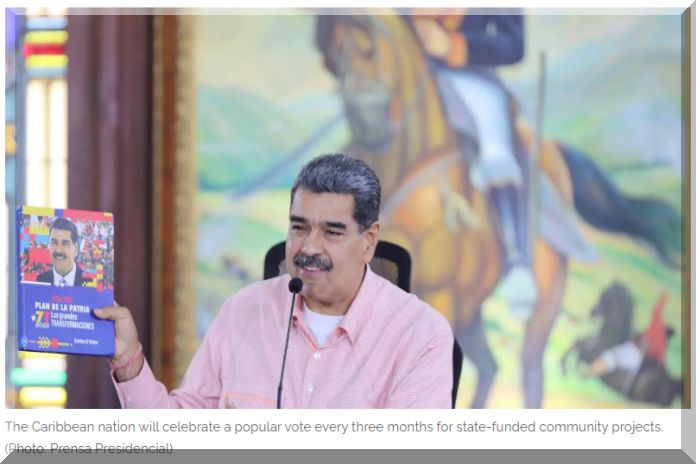CARACAS, (venezuelanalysis.com) – Venezuelan President Nicolás Maduro announced 16 cabinet changes aimed at accelerating economic and social transformations for a new phase of “popular self-government.” During a televised meeting with grassroots activists and government officials on Tuesday, Maduro designated vice-president Delcy Rodríguez as new oil minister, emphasizing her “expertise” in the sector. She will work alongside Héctor Obregón, who will assume the presidency of state oil company PDVSA.
Rodríguez will take over from Pedro Tellechea, who led the oil industry since early 2023 during a significant corruption investigation. His tenure saw improved crude exports during a six-month license issued by the Biden administration. Now, Tellechea will become the minister of industry and national production.
The newly appointed oil minister has been serving as vice-president since 2018 and is a prominent figure within the ruling Socialist Party (PSUV). Rodríguez has held several key positions, including roles in communications and foreign affairs.
In a video shared on social media Wednesday, Rodríguez expressed her gratitude for her new responsibility and reflected on her earlier experience in the Oil Ministry’s International Affairs Office two decades ago when the PetroCaribe initiative was running. The integration project provided Caribbean nations with Venezuelan crude under favourable conditions.
“We will continue on the path laid out by Chávez, and as directed by president Maduro, we will work closely with the people,” Rodríguez stated.
Maduro tasked the new leadership of the oil industry with increasing crude production, which currently stands at 852,000 barrels per day (bpd), according to secondary sources in the latest OPEC monthly report.
“We are building an economy that is not reliant on oil income, yet Venezuela possesses the largest oil reserves in the world. No one can remove us from the global energy equation,” he emphasized while addressing his renewed cabinet.
The Venezuelan president further noted that the country will continue to prioritize food production and other essential needs without depending on oil revenue.
Since 2017, Venezuela’s oil industry has faced significant challenges due to US economic sanctions aimed at undermining the nation’s primary source of income. Following the July 28 presidential election, in which Maduro secured a third term, US officials have raised the possibility of new sanctions, but no policy changes have been announced thus far.
As part of the cabinet reorganization, president Maduro named Anabel Pereira Fernandez the new minister of finance and foreign trade and PSUV vice-president Diosdado Cabello as interior, justice and peace minister.
Other important appointments were Menry Fernández (Agriculture), Leticia Gómez (Tourism), Magaly Viña (Grandparents and Grandmothers), Ricardo Sánchez (Higher Education), Carlos Mast Yustiz (Water), General Raúl Paredes (Housing), Juan José Ramírez (Public Works).
For their part, Héctor Rodríguez and Eduardo Piñate will step down from their roles as governors of Miranda and Apure states, respectively, to take on new positions. Rodríguez will lead the social and territorial socialism mnistry while Piñate assumes the labor ministry. The latter’s previous tenure as labor minister sparked criticism from trade unions due to the approval of a memorandum suspending collective bargaining rights.
Furthermore, Maduro announced the split of the youth and sports ministry into two. Grecia Colmenares will lead youth, focusing on projects for young people in all 4,508 communal circuits spanning the national territory. Arnaldo Sánchez will head sports, responsible for creating a recruitment program in popular neighbourhoods.
Communard leader Ángel Prado was ratified in the communes portfolio, which will absorb the urban agriculture ministry. Foreign affairs minister Yván Gil was likewise confirmed in his post.
Both the new and old cabinet members were instructed to deepen on-the-ground work with communities as Maduro announced the reinforcement of “direct democracy” and “popular self-government.”
Following the appointments, Maduro offered a balance of the second “National Popular Consultation” that took place on August 25 and saw Venezuelans choose community projects to be funded by the state. The vote was held across 4,508 communal circuits throughout the country.
“What happened on Sunday [the popular consultation] shows that we are on the right path of history […] This marks the beginning of a more vibrant and direct democracy, as well as the establishment of a new government that must operate from the grassroots level, in collaboration with the communal councils,” Maduro explained.
The president stated that the Caribbean nation was ready to break with the “old bourgeois democracy” and that the quarterly popular consultation would play a key role in the near future.
“The changes that Venezuela needs will be much better through this path of popular self-government”, Maduro concluded.





